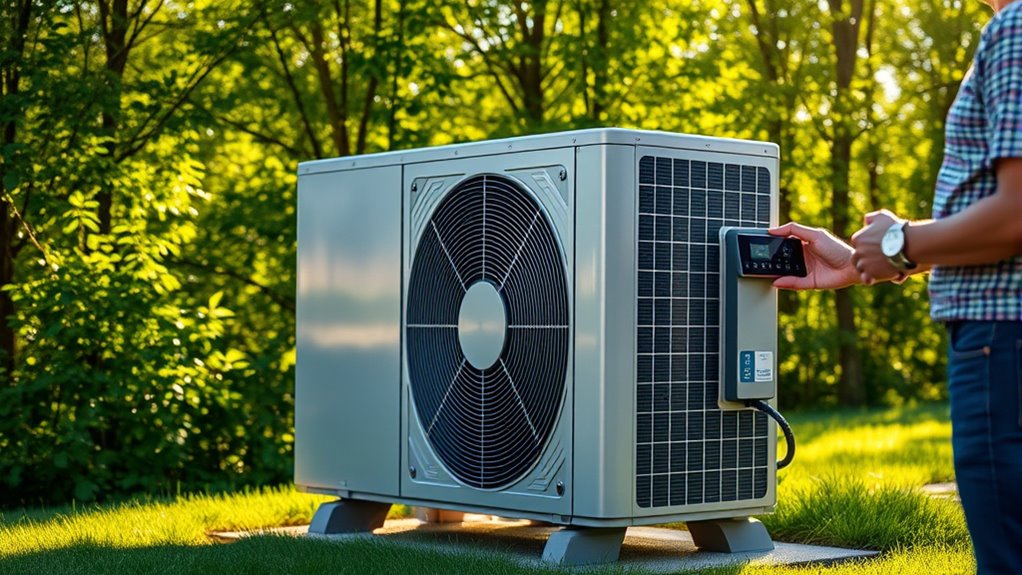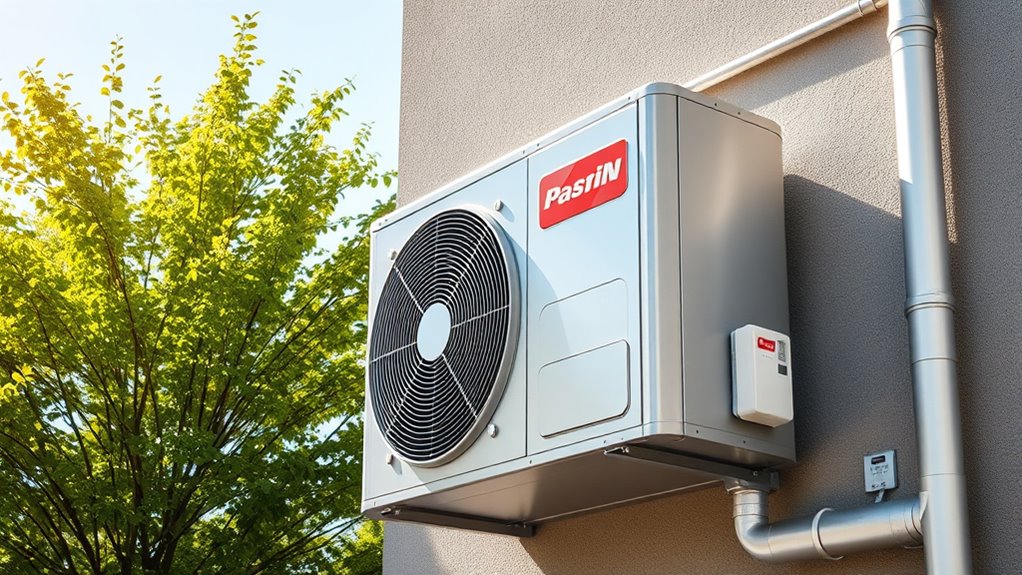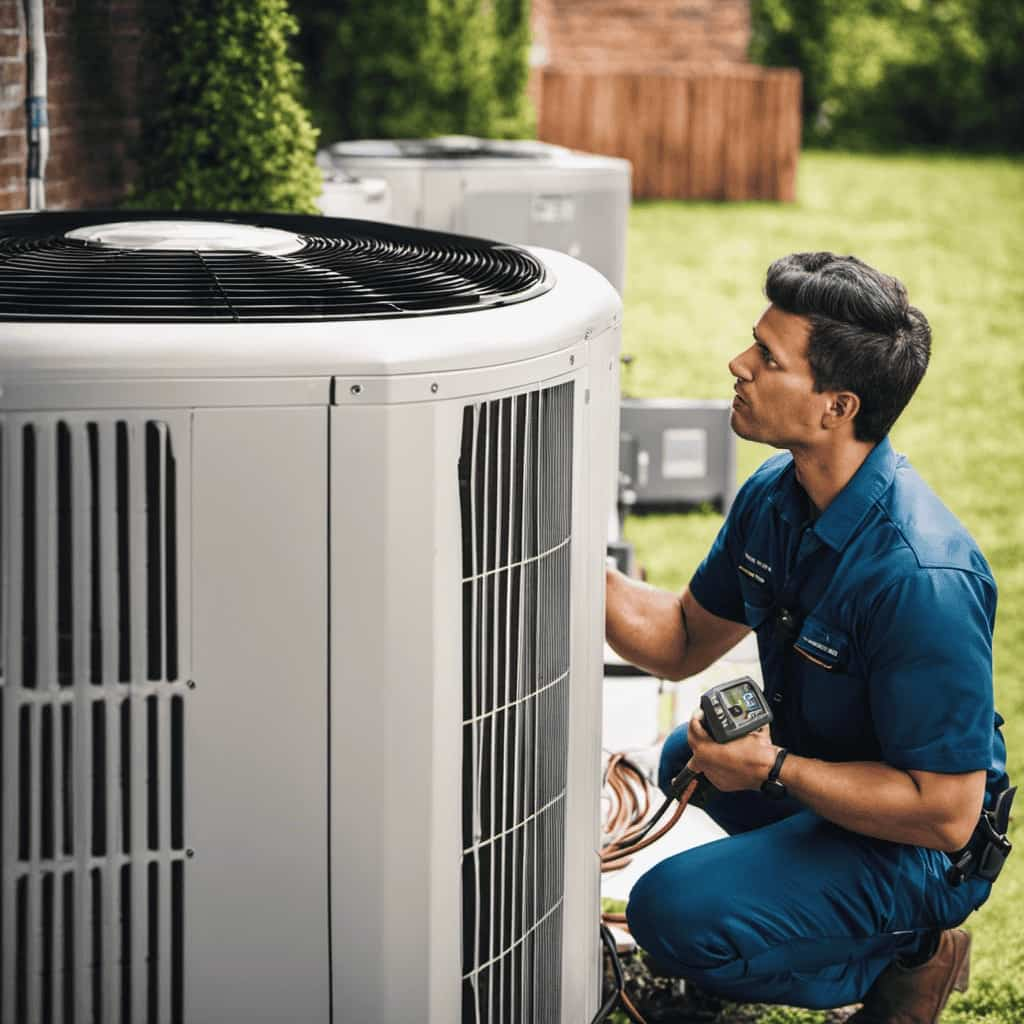Heat pumps play a vital role in decarbonizing HVAC by offering energy-efficient heating and cooling that reduce reliance on fossil fuels. They run on electricity, which can be supplied from renewable sources like solar and wind, lowering your carbon footprint. Advances in technology allow them to operate effectively even in colder climates. If you want to understand how these systems support sustainability and clean energy goals, there’s much more to explore.
Key Takeaways
- Heat pumps reduce reliance on fossil fuels by providing efficient electric heating and cooling, lowering greenhouse gas emissions.
- They are compatible with renewable energy sources like solar and wind, supporting cleaner energy consumption.
- Technological advances enable heat pumps to operate effectively in colder climates, broadening decarbonization potential.
- Smart controls optimize heat pump operation based on renewable energy availability, minimizing emissions and maximizing efficiency.
- Widespread adoption of heat pumps accelerates building decarbonization and supports global sustainability and climate goals.

Heat pumps are transforming how we heat and cool buildings by providing an energy-efficient alternative to traditional HVAC systems. As the push toward decarbonization accelerates, these systems play a essential role in integrating renewable energy sources into our daily lives. Unlike conventional heating and cooling units that rely heavily on fossil fuels, heat pumps harness electricity to transfer heat, making them inherently more compatible with renewable energy integration. When paired with solar panels or wind turbines, heat pumps can operate with a carbon footprint markedly lower than traditional systems. This synergy promotes cleaner energy consumption, helping you reduce greenhouse gas emissions and move closer to a sustainable future.
Energy efficiency is at the core of why heat pumps are so effective in decarbonizing HVAC. They don’t generate heat through combustion; instead, they transfer existing heat from the outside air, ground, or water to inside spaces. This process requires considerably less energy than traditional systems, which often burn fuel or rely on electric resistance heating. As a result, your energy bills decrease, and your household or business becomes more environmentally friendly. The efficiency of heat pumps is especially notable in moderate climates, where they can deliver heating and cooling at a fraction of the energy cost of conventional units. Advances in technology have further enhanced their performance, allowing them to operate efficiently even in colder conditions, broadening their applicability.
Implementing heat pumps also encourages a shift toward smarter, more integrated energy systems. Because they use electricity, you can control and optimize their operation through smart grids and home automation. This means your system can adapt to fluctuating renewable energy availability, maximizing efficiency and minimizing emissions. As the electricity grid becomes greener, the environmental benefits of heat pumps grow even more substantial. Your role in this transition is essential—you can choose to install systems that support renewable integration, making your building more resilient and aligned with decarbonization goals.
Frequently Asked Questions
How Do Heat Pumps Compare to Traditional HVAC Systems in Cost?
Heat pumps typically have a higher initial cost compared to traditional HVAC systems, mainly due to installation expenses. However, they save you money in the long run by using less energy and lowering your utility bills. While the upfront investment might be steeper, the overall cost comparison favors heat pumps over time, especially with energy efficiency incentives and reduced operating costs.
Are Heat Pumps Effective in Extremely Cold Climates?
Yes, heat pumps can be effective in extremely cold climates, especially newer models with frost resilience features. They adapt well to harsh conditions by maintaining efficiency and providing reliable heating. Climate adaptation is key, and modern heat pumps are designed to perform even when temperatures plummet. With proper installation and choosing the right model, you can rely on heat pumps for consistent, eco-friendly heating regardless of how cold it gets outside.
What Maintenance Is Required for Heat Pumps?
You’ll need to regularly check and replace filters to keep your heat pump running efficiently, as dirty filters can reduce airflow by up to 15%. Additionally, routine refrigerant management is essential—leaks can decrease performance and harm the environment. Schedule annual inspections to guarantee filtration systems are clean and refrigerant levels are ideal. Proper maintenance extends your heat pump’s lifespan and helps it operate at peak efficiency, saving you money and reducing emissions.
How Do Heat Pumps Impact Overall Energy Consumption?
Heat pumps improve your home’s energy efficiency by using less electricity to heat or cool, which reduces overall energy consumption. Their ability to transfer heat rather than generate it means you use less power, leading to significant carbon reduction. By switching to heat pumps, you decrease your environmental footprint while enjoying consistent comfort. This makes them a smart, eco-friendly choice for lowering energy bills and supporting sustainable living.
Can Heat Pumps Be Integrated With Renewable Energy Sources?
Yes, you can easily integrate heat pumps with renewable energy sources. By combining solar integration, you can power your heat pump directly from solar panels, reducing reliance on fossil fuels. Additionally, ensuring grid compatibility allows your system to draw or supply electricity efficiently, even during low solar production. This integration helps you lower carbon emissions and enhances your overall energy sustainability.
Conclusion
Heat pumps are transforming how you heat and cool your space, making HVAC more sustainable. Did you know they can reduce energy consumption by up to 50% compared to traditional systems? This efficiency not only cuts your carbon footprint but also saves you money on energy bills. Embracing heat pumps could be your step toward a greener future, helping to decarbonize our environment while keeping you comfortable year-round.









